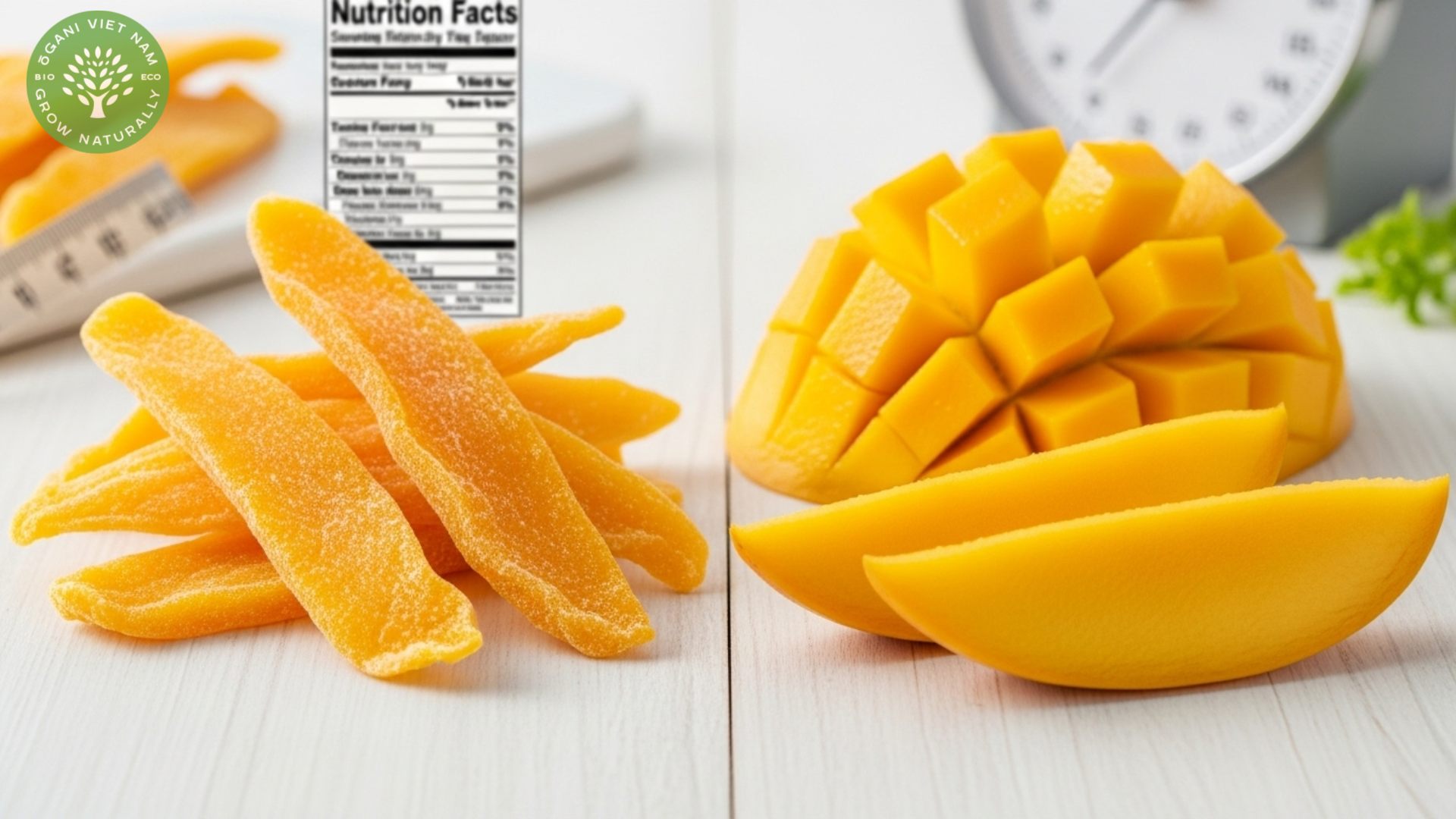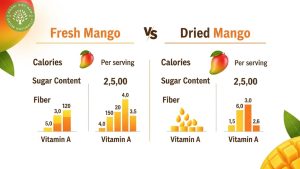
Is dried mango bad for you? The short answer is no – when consumed in moderation, dried mango offers valuable nutrients and health benefits. However, its concentrated sugar content and higher calorie density require mindful portion control to avoid potential health concerns.
Is dried mango bad for you? Understanding the nutrition facts
At Ogani VN, we’ve noticed many customers asking “is dried mango bad for you” when comparing its nutritional profile to fresh fruit. The dehydration process removes water while concentrating nutrients, creating both benefits and drawbacks that directly answer the “is dried mango bad for you” question.
A typical 40-gram serving of dried mango contains approximately 128 calories, 31 grams of sugar, and 2 grams of fiber. While this represents a significant calorie increase compared to fresh mango, the vitamin A content remains robust at about 18% of your daily value. The antioxidant mangiferin, responsible for many of mango’s health benefits, also survives the drying process.

The key difference lies in portion control, which is central to understanding “is dried mango bad for you” concerns. Where you might eat half a fresh mango and feel satisfied, it’s surprisingly easy to consume the equivalent of two or three mangoes when they’re dried. This concentration makes dried mango a double-edged sword – nutrient-dense but calorie-dense.
Is dried mango bad for you? Health benefits that prove
Despite concerns about sugar content, dried mango delivers several noteworthy health benefits when incorporated thoughtfully into your diet.
The vitamin A content supports healthy vision and immune function, while vitamin C acts as a powerful antioxidant protecting cells from damage. B-complex vitamins in dried mango help boost energy levels naturally, making it an excellent pre-workout snack for active individuals.

The dietary fiber content, though reduced from fresh fruit, still contributes to digestive health and helps maintain steady blood sugar levels when consumed as part of a balanced meal. Potassium supports heart health and proper muscle function, while the natural fruit sugars provide quick energy without the crash associated with processed sweets.
Potential health risks and concerns
While dried mango isn’t inherently bad for you, certain aspects require careful consideration. The concentrated sugar content can cause blood sugar spikes, particularly concerning for individuals with diabetes or prediabetes. We’ve found that pairing dried mango with protein or healthy fats can help moderate this response.
The high calorie density makes it easy to overconsume. A single serving can quickly escalate into several hundred calories without providing the satiety signals that fresh fruit offers. This can potentially contribute to weight gain if consumed regularly without adjusting other dietary intake.
Some commercially produced dried mango contains added sugars or sulfites as preservatives. These additives can cause allergic reactions in sensitive individuals and contribute additional calories beyond the natural fruit sugars. Always check ingredient labels when purchasing dried mango products.
Smart ways to include dried mango in your diet
Portion control strategies

The golden rule for enjoying dried mango is moderation. We recommend limiting portions to 30-40 grams daily, roughly equivalent to a small handful. This provides nutritional benefits without excessive sugar intake.
Consider using dried mango as a flavor enhancer rather than a standalone snack. Add small pieces to oatmeal, yogurt, or trail mix to satisfy sweet cravings while maintaining portion control. This approach maximizes taste satisfaction with minimal caloric impact.
Choosing quality products
When selecting dried mango, opt for unsweetened varieties without added sugars or artificial preservatives. Organic options often provide better quality control and avoid unnecessary chemical treatments. Look for products with minimal ingredient lists – ideally just “mango” or “organic mango.”
Texture can indicate quality. High-quality dried mango should be pliable but not sticky, with natural color variation. Avoid products that appear artificially bright or uniformly colored, as these may contain added dyes or excessive processing.
Comparing dried mango to fresh alternatives
When people ask “is dried mango bad for you” compared to fresh fruit, the answer depends on your health goals and eating patterns. Fresh mango consistently outperforms dried varieties in terms of satiety and blood sugar management. The water content in fresh fruit helps you feel full with fewer calories, while the fiber structure remains intact for better digestive benefits.
However, dried mango offers practical advantages including longer shelf life, portability, and convenience. For travelers or busy individuals wondering “is dried mango bad for you” as a snack option, it provides valuable nutrients when fresh fruit isn’t available. The key is treating it as an occasional convenience rather than a daily staple.
When possible, we encourage choosing fresh mango or mixing dried pieces with other whole foods to create more balanced snacks. This approach addresses the “is dried mango bad for you” concern by maximizing nutritional benefits while minimizing potential drawbacks from concentrated sugars.
Frequently Asked Questions
How much dried mango can I eat daily? Limit consumption to 30-40 grams per day to avoid excessive sugar and calorie intake while still enjoying the nutritional benefits.
Is dried mango safe for diabetics? Diabetics should consume dried mango cautiously due to its concentrated sugar content. Pairing with protein and monitoring blood sugar responses is recommended.
Does dried mango cause weight gain? Like any calorie-dense food, dried mango can contribute to weight gain if consumed in large quantities. Moderate portions as part of a balanced diet typically don’t cause issues.
Are there preservatives in dried mango? Some commercial varieties contain sulfites or other preservatives. Choose organic, unsweetened options with minimal ingredients for the healthiest choice.
Can children eat dried mango safely? Yes, but in smaller portions appropriate for their size and caloric needs. It’s an excellent way to introduce children to fruit flavors and nutrients.
Our final thoughts on dried mango and your health
Is dried mango bad for you? Absolutely not when consumed mindfully. At Ogani VN, we believe dried mango can be part of a healthy, balanced diet when you understand its nutritional profile and practice appropriate portion control.
The key lies in treating dried mango as a concentrated nutrient source rather than a casual snack. Choose high-quality, unsweetened varieties, limit portions to 30-40 grams daily, and pair with other whole foods for optimal health benefits.
Ready to enjoy dried mango the healthy way? Browse our selection of premium, organic dried mango products that prioritize quality and nutrition. Your taste buds and your health will thank you for making informed choices.
Read more:
- Is Dried Mango Bad For You? Complete Health Analysis
- Organic Dried Mango: Your Complete Guide To Healthy Snacking
- How to Store Dried Mango & Maximize Shelf Life (Pantry, Fridge, Freezer)
- Dried Mango vs Freeze‑Dried Mango: Nutrition, Texture & Best Uses
- How to Rehydrate Dried Red Dragon Fruit (3 Methods) + What to Make with It

